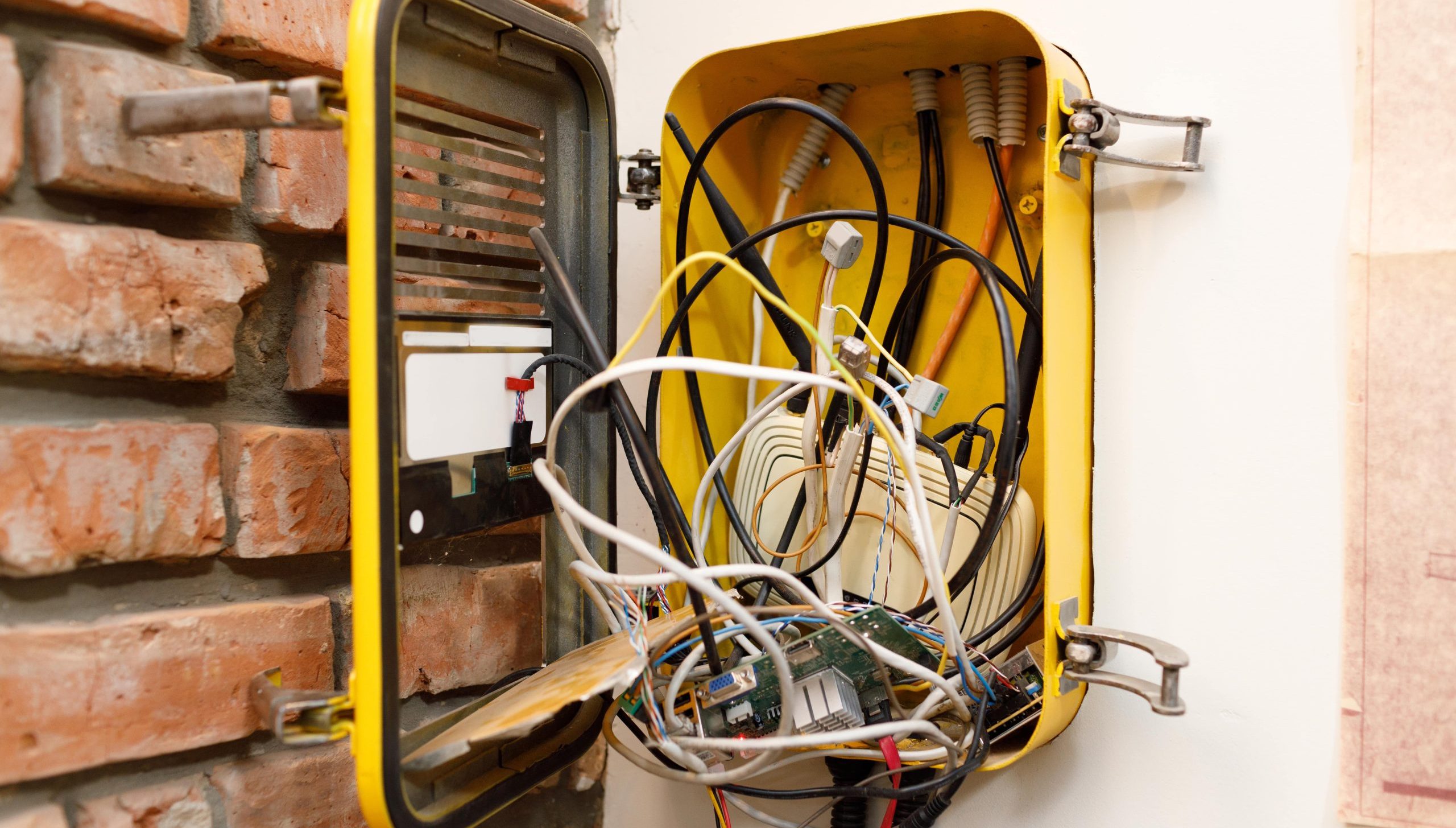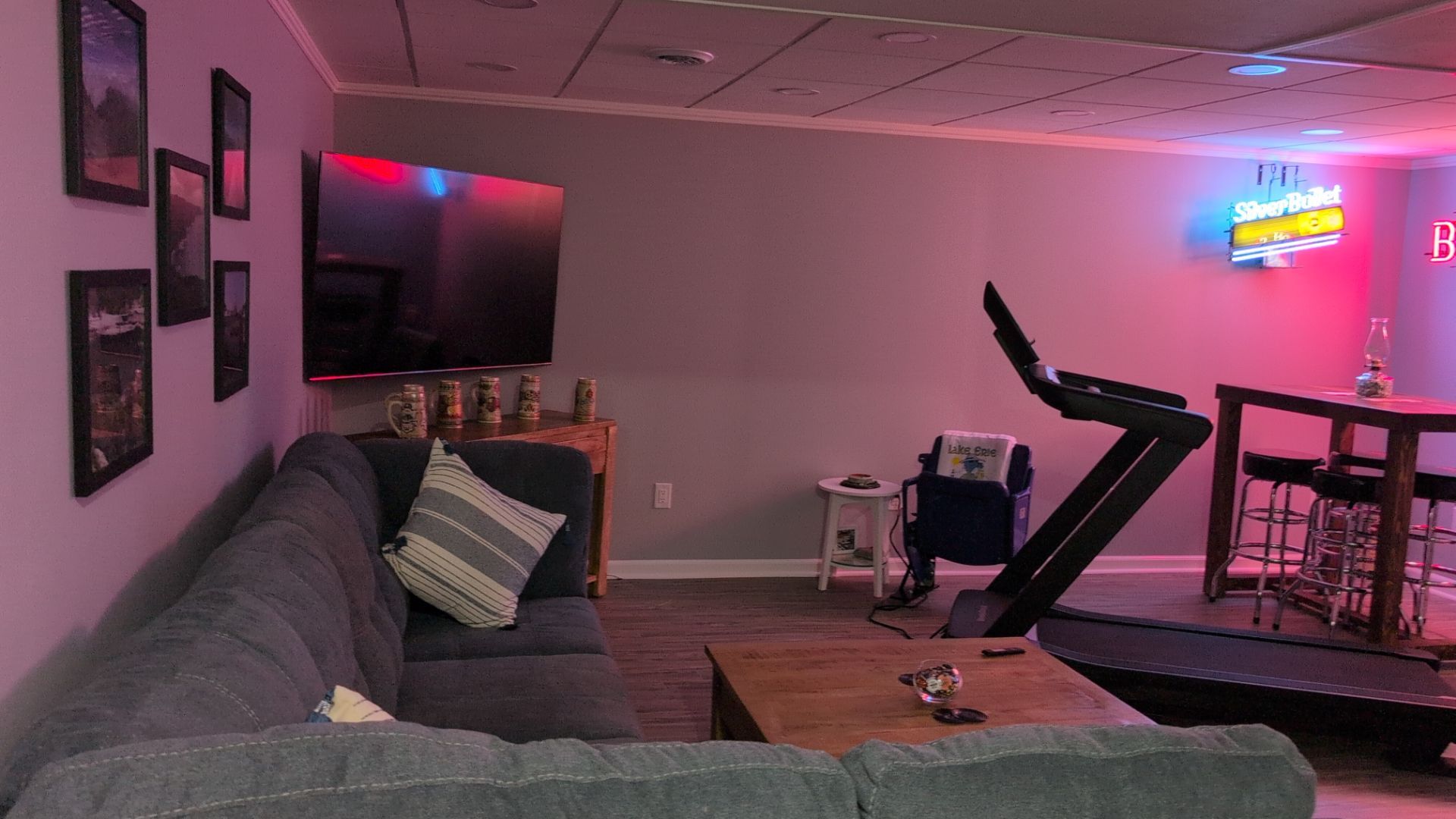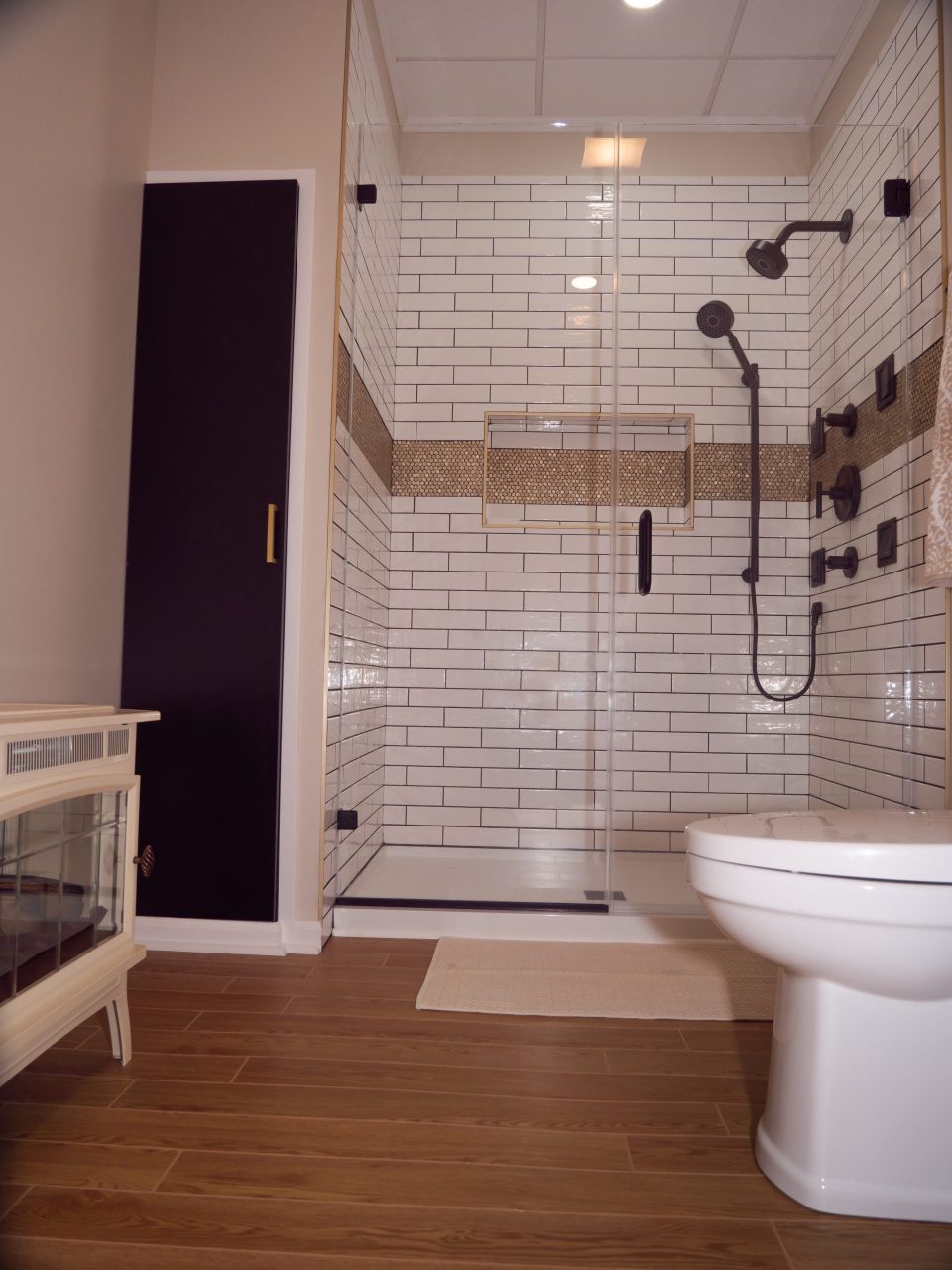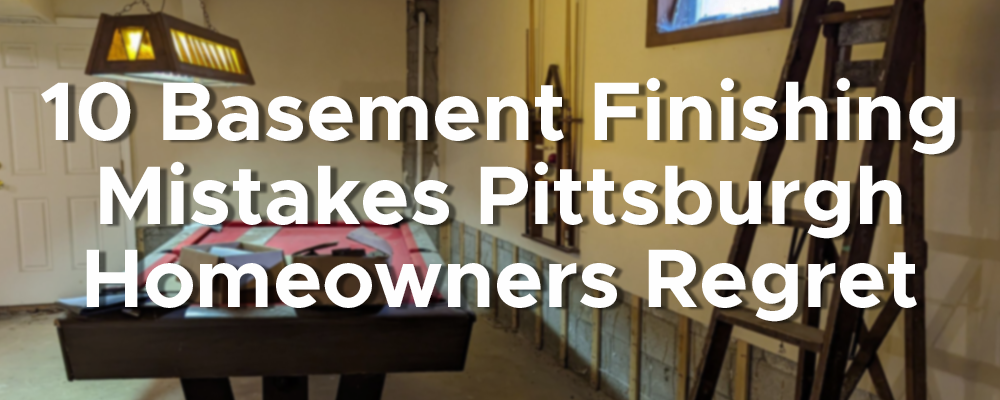Ever wonder what really goes wrong when homeowners finish their basements? What if the space you were excited to build becomes the biggest source of regret in your home?
It happens more often than you’d think—especially in Pittsburgh, where finishing a basement is one of the smartest ways to add usable living space… But it’s also one of the easiest places to make costly, frustrating mistakes. This includes hidden moisture and failed inspections, as well as layouts that just don’t work long-term.
At Energy Swing Windows, we’ve seen hundreds of homeowners regret early decisions just because they didn’t know what to watch out for and subsequently needed our help to refinish their basements.
We specialize in a basement finishing system that’s different from the traditional method, and yes, we strongly believe in it. That means we might be a little biased, but it also gives us a clear view of what works (and what doesn’t) in Pittsburgh’s unique conditions.
These are the 10 regrets we hear most from Pittsburgh homeowners and exactly how to avoid each. From permits to planning to picking the right materials, these are the mistakes you don’t want to learn the hard way.
Ever wonder what really goes wrong when homeowners finish their basements? What if the space you were excited to build becomes the biggest source of regret in your home?
It happens more often than you’d think—especially in Pittsburgh, where finishing a basement is one of the smartest ways to add usable living space… But it’s also one of the easiest places to make costly, frustrating mistakes. This includes hidden moisture and failed inspections, as well as layouts that just don’t work long-term.
At Energy Swing Windows, we’ve seen hundreds of homeowners regret early decisions just because they didn’t know what to watch out for and subsequently needed our help to refinish their basements.
We specialize in a basement finishing system that’s different from the traditional method, and yes, we strongly believe in it. That means we might be a little biased, but it also gives us a clear view of what works (and what doesn’t) in Pittsburgh’s unique conditions.
These are the 10 regrets we hear most from Pittsburgh homeowners and exactly how to avoid each. From permits to planning to picking the right materials, these are the mistakes you don’t want to learn the hard way.
1. Ignoring Moisture Leads to Mold, Rot, and Major Regrets in Pittsburgh Basements
Did you know Pittsburgh gets an average yearly rainfall of almost 38 inches and is expected to see an increase in the future, according to a study by Climate Check?
Basements and moisture go hand in hand—especially in Pittsburgh, where many homes have fully or partially underground foundations. Moisture is the number one reason why most basement finishing projects deteriorate and become unusable over time.
If you finish a basement without addressing hidden moisture or preparing for future moisture, you’re setting yourself up for mold, rot, and major repairs down the line. Remember, just because you can’t see water in your basement does not mean problem-causing moisture isn’t there.
What can go wrong?
- Mold growing behind your drywall
- Warped carpet or flooring
- Musty smells you can’t get rid of
How to avoid it:
- Live in your home for at least one full year before starting on any basement finishing projects. That way, you can spot potential issues that may develop as the seasons change.
- Test for hidden moisture by duct taping a piece of plastic to your basement wall. If there is moisture, it will create condensation on the plastic when you check on it the next day. Watch the video for an example.
- If you get water in your basement every time it rains, consider professional waterproofing (interior or exterior)
- Always use a dehumidifier, even in basements without visible water problems
@inspectiontherapy Do this test before finishing your basement! #fypシ #fyp #basement #finish #wall #concrete #foundation #moisture #wet #dry #humid #vapor #construction #build #diy #home #house #homeinspector #homeinspection #inspectiontherapy #inspectortok #idea #trick #tip #tips #finished #realestate ♬ original sound - Inspection Therapy
2. Skipping Basement Permits Can Kill Your Home’s Resale Value
Permits aren’t just red tape; they’re there to protect you. Skipping them might seem like a shortcut, but it can seriously hurt your home’s value when it’s time to sell.
Regrets you’ll hear:
- "We didn’t know permits were required…"
- "Now we have to rip out drywall to pass inspection."
- "The buyer backed out after seeing our unpermitted basement."
How to avoid it:
- Always check with your local municipality (the city of Pittsburgh and parts of Allegheny County almost always requires permits)
- If hiring a contractor, confirm that they’ll handle all permitting and inspections, have a PA Registration number, and are covered with adequate insurance (like Liability and Workers’ Compensation)
Make sure fire-blocking and egress requirements are met for safety
FAQ: Permits to Finish Your Basement in Pittsburgh
3. DIY Basement Finishing Often Costs More (and Ends in Regret)
YouTube can teach you a lot, but it can’t prepare you for plumbing mistakes or electrical hazards.
Common DIY regrets:
- Uneven walls and ceilings
- Poor insulation or vapor barriers
- Unsafe wiring or hidden code violations
- Months (or years) of delays

Advice:
- Know your limits. Even if you think you can do it yourself, that doesn’t mean you should.
- Start small with DIY projects before tackling a full basement renovation
- Don’t underestimate the value of a pro who’s done this hundreds of times
DIY basement finishing can cost you more in the long run if done wrong.
4. Basement Finishing in Pittsburgh Can Cost $40K–$100K—Here’s Why Most Budgets Miss the Mark
Let’s be honest: basement finishing isn’t cheap. However, it is the least expensive way to add space you want or need. But what hurts more than the upfront cost is running out of money halfway through.
Why this happens:
- Using unrealistic online cost calculators
- Pricing based on DIY labor only
- Falling in love with expensive Pinterest ideas
How to avoid it:
- Build in a 25% buffer for surprises, changes and upgrades
- Prioritize function over flashy features
- Get a clear, detailed estimate from a professional
Average Total Basement Finishing Costs by Size:
In Pittsburgh, the average cost to professionally finish a basement ranges from $40,000-$100,000+. If you’re wondering why a professionally finished basement is so expensive, read our guide on basement finishing costs in Pittsburgh.
| Size of Basement (sq ft) | Estimated Cost | Monthly Payment (12-Year Plan) |
|---|---|---|
| 300 – 400 sq ft | $36,500 – $49,000 | $415 – $557 |
| 400 – 500 sq ft | $48,000 – $60,500 | $546 – $688 |
| 500 – 600 sq ft | $59,500 – $71,500 | $677 – $813 |
| 600 – 700 sq ft | $70,500 – $83,000 | $802 – $944 |
| 700 – 800 sq ft | $82,000 – $94,500 | $933 – $1,075 |
| 800 – 900 sq ft | $93,500 – $106,000 | $1,064 – $1,206 |
| 900+ sq ft | $103,500+ | $1,172+ |
5. Traditional Building Materials Can Rot, Mold, or Collapse Below Ground
Standard drywall, wood studs, and carpet might work upstairs, but in a basement, they can be a disaster. Why?
- Organic materials, such as wood, absorb moisture, causing them to deteriorate and grow mold
- Carpets trap water and moisture from the concrete floor below, and any plumbing leaks from above
- Moisture trapped in fiberglass insulation can be a breeding ground for allergens and mildew
- Moisture and decaying material can grow mold and attract insects, such as termites
Comment
byu/seattlewhite from discussion
inHomeImprovement
Better options:
- Modern, inorganic wall systems with cement board and closed-cell insulation
- Vinyl plank flooring that doesn’t absorb water and feels warmer underfoot
- Drop ceilings with removable mineral wool tiles for easy access
6. A Bad Basement Layout Wastes Space and Ruins Resale Potential
A finished basement should support your lifestyle, not work against it. Many homeowners regret designing layouts that they outgrow or don’t actually use.
A layout that wasn’t thought through is something homeowners regret later down the line, when it’s too late to make changes in the design phase. This is where getting suggestions from an experienced basement designer can prevent problems you’ll later regret.
Regret triggers:
- Hallways that waste space
- No room for storage
- Natural light is blocked by interior rooms
- No access to utilities when service is needed
Planning tips:
- Think about how you’ll actually use the space (TV zone, guest room, storage)
- Leave room for evolving needs—your child’s playroom might become a teen hangout
- Keep at least one area unfinished for storage and long-term flexibility
Did you know that the size of your basement is one of the biggest factors for the price of the project? Read our guide on how basement size affects the cost and what ways you can best utilize your finished space.
7. Bad Lighting Turns a Finished Basement Into a Cave
Lighting isn’t an afterthought; it’s essential in a basement space that has little to no natural light. Poor lighting can make a great floor plan look and feel bad.
What can go wrong:
- One bright overhead light = dungeon vibes
- No dimming = can’t watch a movie without glare
- No zoning = entire basement lights up when someone’s watching TV
How to do it right:
- Use multiple zones (e.g., bar, TV area, playroom)
- Install dimmers for adjustable ambiance
- Layer overhead lighting with sconces or LED accents

8. Skipping HVAC and Plumbing Planning Now = Expensive Tear-Outs Later
Even if you’re not installing a bathroom or kitchenette yet, ignoring the infrastructure now can cost you big later.
Avoid these regrets:
- “We wish we had run the drain before putting down flooring and walls…”
- “Our upstairs now gets less heat because the basement vents are always open.”
- “We had to tear into drywall just to add outlets.”
How to avoid it:
- Plan ahead for plumbing—even if you’re not installing that bar today
- Add supplemental heat like electric baseboards or a gas fireplace (especially if your current HVAC is stretched thin)
- Keep utility areas (like furnace and laundry areas) spacious and accessible for future maintenance

9. The Wrong Contractor Can Leave You With an Unfinished, Unsafe Basement
Not all contractors are created equal, and the wrong one can leave you with more headaches than usable space.
Red flags to watch for:
- No physical office or showroom
- No written scope of work or drawings
- Uses only subcontractors with little oversight
- Can’t answer questions about moisture, HVAC, or code compliance
- Can’t show proof of insurance, Workers’ Compensation, or Pennsylvania Contractor Registration
What to ask before signing:
- Do you specialize in basement finishing?
- Will you handle permits and inspections?
- Can I see your work in person?
- Who will actually be doing the work?
- Do you have proof of PA Contractor Registration?
- Can I see proof of insurance verification?
- How are changes and upgrades handled?
| 🚩 Red Flags (What to Watch Out For) | ✅ Green Flags (What to Ask / Look For) |
|---|---|
| No physical office or showroom | Specializes in basement finishing |
| No written scope of work or drawings | Will handle permits and inspections |
| Uses only subcontractors with little or no oversight | Can show past work in person |
| Can’t answer questions about moisture, HVAC, or code compliance | Clearly identifies who will be doing the work |
| Can’t show proof of insurance, Workers’ Compensation, or PA Contractor Registration | Provides proof of PA Contractor Registration |
| Offers proof of insurance and Workers’ Compensation | |
| Explains how changes and upgrades are handled before the job starts |
Want to see how Pittsburgh homeowners are choosing between basement systems? Compare the Total Basement Finishing system vs. traditional basement remodeling methods here.
10. Shortcuts Now = Fewer Offers and Lower Appraisal Later
If you're investing in your home, make sure you're adding long-term value, not hidden liabilities.
What hurts value:
- No permits
- Non-code-compliant bedrooms (no egress)
- Mold-prone materials
- Awkward layouts with no storage
A quality basement renovation, done right, can absolutely improve your resale appeal. But only if future buyers see it as a bonus, not a burden.
How Do You Know If You're Really Ready to Finish Your Basement?
Before jumping in, ask yourself:
- Have we lived here long enough to understand how we’ll use the space?
- Do we have the budget (or access to financing) for what we actually want?
- Are we solving a now problem (e.g., “we need a second living area”) or just dreaming about someday?
If your answer to those is “yes,” and you're ready to plan with purpose, you’re on the right track. If not, it might be worth waiting a bit longer.
Final Thoughts: Finish Smart, Not Fast
Finishing a basement doesn’t have to come with regret—if you know what to look out for. Now that you’ve seen the most common mistakes Pittsburgh homeowners face, you’re better equipped to plan a space that works for you today and adds value tomorrow.
Too often, people jump into these complex projects without realizing how things like moisture, code issues, or poor layout decisions can create long-term headaches.
We’ve seen it. We’ve fixed it. And we’ve helped homeowners avoid it altogether.
If you're thinking about finishing your basement, a good next step is to learn how the traditional finishing approach compares to the system we use at Energy Swing. It’s designed specifically for below-grade spaces in homes like yours, and understanding the differences might help you decide what’s best for your needs.
We’re not here to sell you a system. We’re here to make sure you’re informed before making one of the biggest updates to your home.


